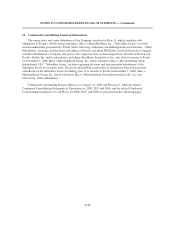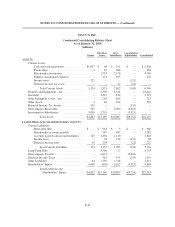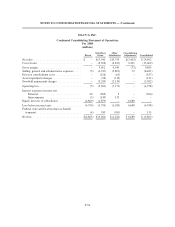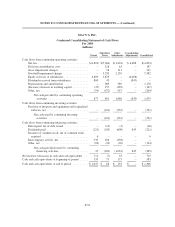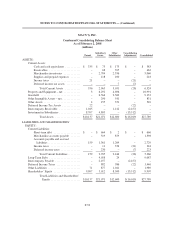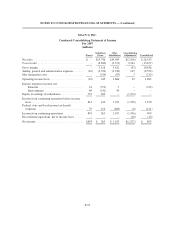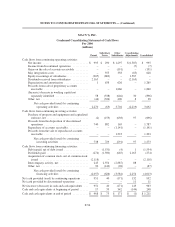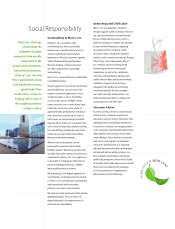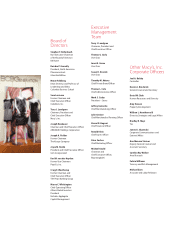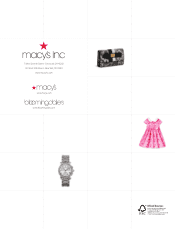Macy's 2008 Annual Report Download - page 106
Download and view the complete annual report
Please find page 106 of the 2008 Macy's annual report below. You can navigate through the pages in the report by either clicking on the pages listed below, or by using the keyword search tool below to find specific information within the annual report.
Social Responsibility
Sustainability at Macy’s, Inc.
At Macy’s, Inc., we believe that
contributing to a more sustainable
environment is good business practice
and the right thing to do for future
generations. We must, however, operate
within the bounds of good business
decision-making so that each action
we take is measurable, sustainable
and enduring.
Macy’s, Inc.’s commitment to sustainability
is multidimensional.
We are aggressive in our drive to eliminate
wasteful behavior. In some cases, this
requires consistent application of very
simple principles, such as reminding
our associates to turn off lights when
rooms are not in use, to print fewer hard
copies of e-mails, to recycle waste, to
optimize facility performance and to use
mass transit for commuting to work. In
other cases, we are pursuing systematic
improvements to the way we do business,
such as better targeting customer mailing
lists and shifting marketing to electronic
media so we are printing and sending
fewer printed advertisements.
Where we have the option, we are
pursuing the most environmentally
friendly solution. Whenever possible and
sensible within the context of our business
requirements, Macy’s, Inc. is as aggressive
as possible in changing for the better to
preserve endangered forests, wildlife,
water quality and eco-systems.
We are taking a 360-degree approach to
sustainability, involving everyone around
us. Macy’s, Inc. will advocate sustainability
and renewability with our vendor
partners, associates and customers.
We measure what we do and strive toward
quantifi able goals. Thus, we have set
quantifi able goals for improvement in
each area of sustainability.
Sweatshops and Child Labor
Macy’s, Inc. has adopted a stringent
Vendor/Supplier Code of Conduct that sets
out specifi c standards and requirements
for any vendor doing business with us.
All of the company’s vendors are required
to sign written affi rmations, agreeing
to comply with the company’s Code
of Conduct that is designed to protect
workers in this country and abroad. Among
other things, the Code requires Macy’s,
Inc.’s vendors to allow unannounced
factory inspections for contractual
compliance, as well as for compliance
with laws and regulations dealing with
child or forced labor and unsafe working
conditions. Inspections of factories
engaged in the production of private
brand merchandise for the company
are made routinely, and violations can
lead to termination by the company for
noncompliance with the Code.
Consumer Choice
In a free society as eclectic and ethnically
varied as ours, customers expect and
demand a range of choices that meet their
individual needs and fashion preferences.
In our role as retailers, we recognize that it
is the consumer who ultimately determines
what products will continue to be viable
retail off erings. Those decisions are made
daily at the cash register by individual
consumers and function as a singularly
eff ective barometer for determining what
will and will not be sold by retailers in a
free and open marketplace. Varied and
confl icting viewpoints about what should
or should not be sold underscore our belief
that factors unrelated to the workings
of a free economy are inappropriate
determinants of retail off erings.
There is no shortage
of talk about the
obligation of public
companies to be socially
responsible to the
people and communities
where they do business.
At Macy’s, Inc., we hold
those same beliefs, along
with a belief that actions
speak louder than
words when it comes to
helping tackle some of
the toughest problems
facing us today.


